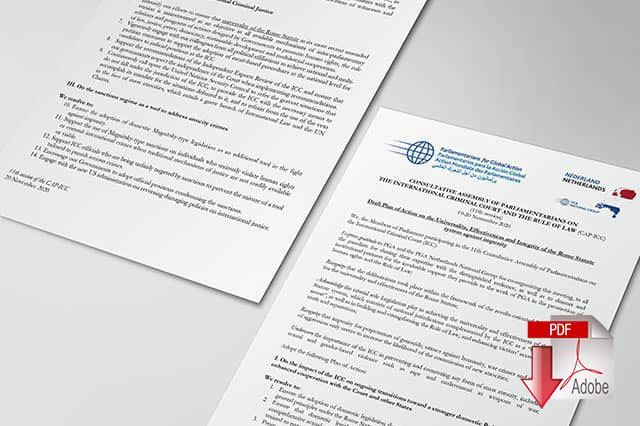On 19-20 November 2020, Parliamentarians for Global Action (PGA), together with the PGA National Group in The Netherlands, co-hosted the 11th Consultative Assembly of Parliamentarians on the International Criminal Court and the Rule of Law (CAP-ICC). For the first time in PGA’s history, the CAP-ICC was held virtually, given the current circumstances that have led to a global health emergency, making it impossible to organize in-person meetings. Among the 148 participants, there were 85 Members of Parliament from 41 regions across the world, including Mr. Jan Anthonie Bruijn, President of the Senate of The Netherlands, Sen. Boris Dittrich, Chair of the PGA National group in the Netherlands; ICC officials, including H.E. Chile Eboe-Osuji, president of the ICC, H.E. O-Gon Kwon, President of the Assembly of States Parties (ASP), and Mr. James Stewart, ICC Deputy-Prosecutor; State Representatives, including Amb. Paul van den Ijssel, Permanent representative to the Organisation for the Prohibition of Chemical Weapons (OPCW) and the International Criminal Court (ICC); and Members of International Organizations, Civil Society and experts.
The two-day international conference enabled the expert panelists and the audience to exchange on fundamental aspects of the Rome Statute system such as complementarity and cooperation and debate about the future of the ICC as 2020 is an important year for its composition and governance. One of the many highlights of the event was the intervention of Dep. Beatrice Epaye (Central African Republic), President of the Foreign Affairs Committee and PGA Board Member, on the positive impact the ICC has had on the strengthening of the domestic rule of Law even though the country is facing a severe political and security crisis. Mr. Amady Ba, Head of the International Cooperation Unit at the OTP outlined the Court’s work in Central African Republic and Sudan that are in a transitory political conjuncture. Mr. Salih Mahmoud Osman, Member of the Parliamentary Legislative Committee, explained how the transition came about after the dictatorship of Mr. Al-Bashir. Despite the fragility of the judicial apparatus in both countries, a lot of progress has been made toward accountability and capacity-building at the domestic level, with the strong cooperation of the Court. Honoring the PGA tradition of closing events with a Plan of Action, on 20 November, Members of Parliament in attendance adopted a number of action points, through which the parliamentarians they will further advance the universality and effectiveness of the Rome Statute system of the ICC in their respective jurisdictions.
The CAP-ICC is the only high-level global gathering of political leaders focused solely on international justice and the Rule of Law. Since 2002, its meetings have represented a unique opportunity for Lawmakers worldwide to discuss and define strategies towards reinforcing international and domestic criminal justice and the prevention of the most serious crimes of concern to the International Community as a whole, namely genocide, crimes against humanity, war crimes, and aggression, while promoting the rights of victims and of the accused. Past deliberations of the CAP-ICC subsequently informed and inspired initiatives of several hundred Lawmakers which led, as of today, to the ratification of the Rome Statute by 78 out the current 123 States Parties and to the domestic implementation by 37 States.
As the world grapples with already divided and fragile societies suffering from armed conflicts, the ‘natural disaster’ caused by the novel Coronavirus pandemic has exacerbated inequities and the commission of serious human rights violations and mass atrocity crimes. Moreover, the unprecedented use of the so-called “sanctions” imposed by the United States against ICC officials have represented an attack against the Court’s judicial and prosecutorial independence. Such measures attracted principled reactions from States Parties and stakeholders within the US and worldwide. Indeed, U.S. Congressman James P. McGovern, Co-Chair of the Tom Lantos Human Rights Commission and PGA Member, gave a comprehensive overview of the U.S. policy toward the ICC is the past years and how this upcoming administration may reverse previous actions taken. Congressman McGovern, through his forceful remarks, reminded the audience that accountability for international crimes and bringing justice to victims of said crimes should not be a partisan issue.
Watch: Rep. James McGovern on the USA's Position on the Rome Statute System Against Impunity »
Today, at a moment when democracy, peace, justice, and the rule of law are under pressure from multiple fronts, the International Criminal Court is needed more than ever to advance human rights protections and the universal goal of preventing future atrocities. The ICC represents part of a global system, alongside other mechanisms and national courts, that serves the goal to hold perpetrators accountable for these crimes and uphold international justice and the rule of law. This global system is not perfect but can be improved. Justice Richard Goldstone, Chair of the ICC Independent Expert Review Panel touched upon some of the challenges that the Court is facing. Ms. Petra Bayr, MP (Austria) went into great detail on the recommendations that legislators should take up at the domestic level to ensure that their government participates while respecting the Court’s independence, in supporting reform efforts. In this sense, Amb. Christian Wenaweser, Permanent Representative of Liechtenstein to the UN, mentioned some of the communications challenges between the Court and the Assembly of States Parties. Only through dialogue and respect for the competence and independence of each organ that progress will be made in effecting pertinent changes for expected results.
Vulnerable communities throughout the world have been affected by the pandemic which has had severe consequences on the level of gender-based violence crimes. These crimes are used as tools of war, which is why the Office of the Prosecutor (OTP) of the ICC has particular policies when it comes to sexual and gender-based violence crimes. As Prof. Patricia Viseur Sellers, Special Adviser on Gender at the OTP, explained to the audience, “a gender-specific mode of liability to hold the perpetrators of sexual and gender-based violence accountable is just as important as the underlying crimes that accompany such violence.” Such violence has to do partly with culture. Ms. Shandana Gulzar, MP (Pakistan), Chairperson, Commonwealth Women Parliamentarians of the CPA rightfully emphasized that while women and girls are encouraged to speak on this issue, males, especially young boys are forbidden to do so. A culture of omerta and impunity only fosters a fertile ground for the commission of more atrocities. The Rome Statute system is also a prevention mechanism. What makes atrocities unspeakable is not only the crimes themselves, but that they were preventable. Prof. Irwin Cotler, Chair of the Raoul Wallenberg Centre for Human Rights, in a forceful plea, encouraged all participants to act to make the “never again” principle a reality. Mr. Fabio Massimo Castaldo, MEP (Italy), vice-president of the European Parliament and PGA member, reminded the audience that with war crimes and other mass atrocities unaccounted for, violence and corruption will continue to prevail, undermining international justice and peace.
Despite the challenges that the Court and the Rome Statute system face, the pursuit of justice for the most heinous crimes must continue. The 11th CAP-ICC focused on current obstacles and upcoming opportunities in attaining, through the Rome Statute, a universal justice system at domestic and international levels. 2020 is a crucial year for the ICC as the Assembly of States Parties will elect a new Prosecutor, six new judges and is considering the recommendations contained in the Independent Expert Review report.
Parliamentarians need peer-support to share strategies and effective solutions to collectively strengthen democratic institutions and coordinate domestic, regional, and international responses to human rights violations under the rule of law. States Parties, civil society organizations, and all those involved with preserving this noble cause must unite to reiterate their commitment to uphold and defend the principles and values enshrined in the Rome Statute and maintain its integrity from any threats against the Court and its officials. The vision of the CAP-ICC, consisting of creating and sustaining a global parliamentary constituency for the Rome Statute system, is shared and made possible thanks to the support of the European Union (EU), European Instrument for Democracy and Human Rights, the Governments of The Netherlands, Switzerland, Liechtenstein and the OAK Foundation. PGA received core support from Stewart R. Mott Foundation, Sweden (Sida), and Denmark (Ministry of Foreign Affairs).





